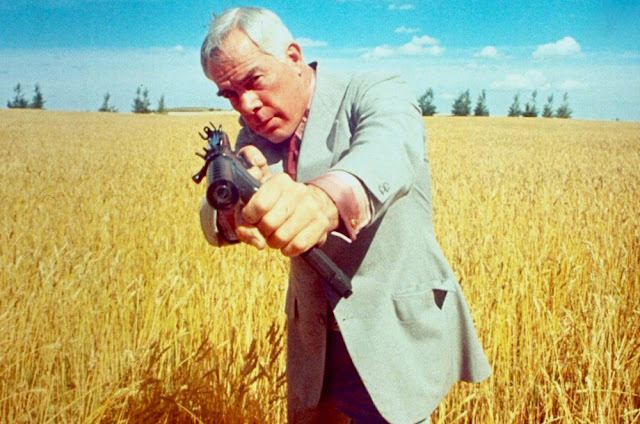Prime Cut
Those who settle in for the expected low grade actioner may have a surprise or two in store for them with 1972's PRIME CUT. The plot - involving a Chicago mobster who travels to Kansas City, Kansas to collect a sizable debt from a longtime rival who now runs a meatpacking plant - promises lots of grisly violence and narrow scrapes. This being a '70s pic, at least one or two nude scenes are part and parcel. Probably also some sharp dialogue and a downbeat ending. Many of those elements exist in director Michael Ritchie's third movie, but he and screenwriter Robert Dillon have fashioned an appealingly low key, fast paced, and truly oddball crime drama that uses its milieu to the best possible advantage.
KC is not Chicago. Nick Devlin (Lee Marvin) learns that quickly as he and some Irish mafia cohorts navigate endless wheat fields and county fairs. Nick finds "Mary Ann" (Gene Hackman), gorging on a plate of tripe in a huge barn during a white slave auction. The kind where dozens of young orphans lie drugged and naked on bales of hay, waiting to be purchased by wealthy rednecks. One of the girls is lucid enough to call out to Nick for help. Her name is Poppy (Sissy Spacek), and Nick drapes her over his shoulder, telling Mary Ann she is collateral while he waits for the several hundred K to be paid. Mary Ann tells him to come back tomorrow, to the fair. The slave trader/meat packer also speechifies/defends his new locale, his adopted heartland, meanwhile dismissing Chicago as "..an old sow, begging for cream."
The county fair sequence is the centerpiece of PRIME CUT, with its expertly rendered cornpone atmosphere. In the midst of the action, which (in an obvious nod to Hitchcock) will eventually involve a threatening combine harvester, Ritchie takes the time to introduce characters like a woman who sells fresh milk from her own holstein (Nick's reaction to its taste is priceless) and kids who've entered their steers in a competition. The local color is quite vivid in this movie. What makes it even more appealing is the subtle humor laced within by the filmmakers. Other times, not so subtle - check the final fisticuffs, involving a limp sausage. Or the suspicious rough and tumble play fighting between Mary Ann and his brother.
Surprisingly, scenes in the meat packing plant are relegated mainly to the opening (and love those titles and Lalo Schifin's scoring) and closing of PRIME CUT. I expected more characters to end up as sausage links, although the story is set in motion by a delivery of just that to the Irishmen in Chi town. It's as colorful as a backdrop as I can imagine for a crime tale.



Comments